Recently retired University of Chicago Police Department (UCPD) officer Gordon Dameron suspected something was wrong with his wages around 2015; he was making the same amount as officers who had served for far fewer years than he had. He couldn’t fully determine what the issue was until Officer Victor Vazquez, president of Police Benevolent and Protective Association of Illinois, Local 185 — UCPD officers union — informed him that he had been missing his longevity raises since 2017.
According to documentation that Dameron showed the Maroon, the University originally confirmed on April 6, 2023 that he was owed $25,166.08 in retroactive payments to make up for the missed raises.
When he actually received the retroactive payment on June 11, 2023, it was only $16,250.
Dameron’s case was part of a widespread issue in which numerous officers were paid incorrect wages over the course of several years, union representatives President Vazquez, Vice President Alexander Donner, and Treasurer Joseph Augustyn informed the Maroon. Twelve officers were being underpaid and an unconfirmed number were being overpaid; some of the cases dated back more than a decade. Although the union reports that the University has spent more than $120,000 paying back officers over the past year, they also claim that the University owes officers significantly more money. The University has not commented on the issue of wage discrepancies or how they originated, nor did they comment on cases involving individual officers due to privacy concerns.
Dameron retired in March 2024 after serving 23 years as a police officer and 18 years at UCPD.
“I was a pretty dedicated officer. And I spent a lot of years… doing the job to the best of my ability,” he told the Maroon in an interview.
He expressed disappointment in the way things ended and said the University never gave him a full explanation of why these discrepancies occurred in the first place or what they planned to do to avoid these situations in the future.
“If [Vazquez] didn’t come across this issue, there’s a very strong possibility that none of us would have known anything about [it],” Dameron said.
According to union representatives, the wage discrepancies began to unfold in November 2022, just after the union and the University first became embroiled in contract negotiations in August 2022 to modify its collective bargaining agreement (CBA) that expired in April 2023. The negotiations have amounted to the union filing a National Labor Relations Board (NLRB) case against the University alleging bad faith bargaining.
However, the University maintains that it “is bargaining in good faith with the University of Chicago Police Department (UCPD) police officers’ union, the Illinois Police Benevolent and Protective Association (PB&PA). We greatly value the work of UCPD officers in service to our community and have built constructive relationships with the union’s leadership for a number of years,” according to a written statement by a University spokesperson to the Maroon.
Amid preparations for negotiations, Vazquez discovered pay discrepancies in officers’ salaries arising from missed longevity or annual increases. Longevity raises add to an officer’s base hourly salary according to the number of years they have spent working for the department.
The union returned to the issue of negotiating a new contract in May 2023 and negotiations are ongoing as of April 26 this year. In March 2024, the officers’ union filed a report with the NLRB accusing the University of participating in surface bargaining and direct dealing on a newly proposed step wage system and Cost of Living Adjustments (COLAs). Surface bargaining alleges that the University is negotiating with the union without intention to achieve a collective deal, while direct dealing alleges that the University has bypassed Union negotiators to deal directly with individual officers. Yet this isn’t the first time the officers’ union CBA negotiations with the University have been held up due to wage disagreements.
According to the union, the University explained that their shifting contract proposals this February came as a result of sudden financial pressures. This explanation has left the union perplexed, as they assumed the University had been aware of growing financial pressure since last fall.
Alongside the University’s ongoing financial pressures, 2024 has been a busy year for university-affiliated unions. In March, the university nurses’ union ratified a new contract with the University of Chicago Medical Center (UCM), prompting the union to call off their previously announced plans to strike. In April, the Graduate Students United (GSU) ratified their first-ever contract with the University after indicating “willingness to strike.”
“Over many decades, the University has built productive relationships with numerous unions, including the Illinois PB&PA, and unions currently represent more than 4,000 employees at the University,” a University spokesperson wrote to the Maroon.
UCPD’s officers are contractually prohibited from striking “or interference with the University’s functions or operations, regardless of the reason,” according to the UCPD officers union’s most recent CBA. The union opposes police strikes because they believe a strike would threaten public safety. Although their commitment to these principles remains strong, pay discrepancies and heated contract negotiations have heightened tensions between the University and the union.
“We are truly dedicated to doing our jobs and it means a lot to many of us that we keep the UC community safe. As police officers our nature is to protect and serve. It’s ingrained in us,” Vazquez wrote in a statement to the Maroon.
However, the union representatives have raised concerns that wage discrepancies, coupled with ongoing contract negotiations, are “creating a lot of morale issues. Because of these morale issues many officers are starting to look at leaving to other departments, which is good for no one,” Vazquez wrote.
Wage Discrepancies
Vazquez first discovered discrepancies in officer wages in November 2022. While the union was still awaiting a formal response to its intent to modify its CBA, Vazquez began planning for the union’s proposal for officer salary increases in the new contract. For due diligence, Vazquez looked at other local departments’ average salaries, comparing them with payroll printouts he had requested from the University for all officers in the union.
He expected union officers with the same number of years of service to have equivalent salaries but discovered that officers who should have had equivalent salaries were making significantly different amounts.
Vazquez found that the University had not paid certain officers their longevity raises or had paid officers longevity raises at incorrect times. For some officers, the pay discrepancies had begun five years prior, while others had been affected for longer, with the longest wage discrepancy going back 15 years. Vazquez would go on to find 12 officers who had been underpaid due to withheld longevity raises, estimating that the amount the University owed officers was “a six-figure problem,” he wrote to the Maroon.
According to the most recent CBA, officers are supposed to receive longevity raises of $1 hourly after two years at the department, $2 hourly after three years, $1 hourly after years six, nine, and 12 years, and then a $1 hourly raise every three years after 15 years of service.
In addition to longevity increases, all officers regardless of seniority received general COLA increases to their hourly pay rate under the most recent CBA. In July 2018 and 2022, officers received a general increase of 3.0 percent, while they received a 2.75 percent increase in July 2019, 2020, and 2021.
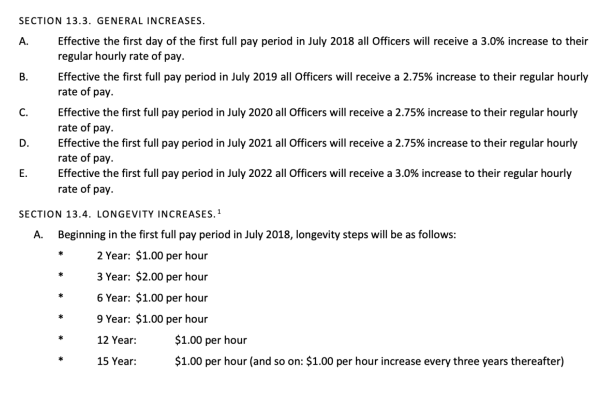
Vazquez resolved to bring his concerns to the University. On November 17, 2022 he alerted the UChicago Employee and Labor Relations office of the first pay discrepancies, and that he would continue to direct them to more pay discrepancy issues for individual officers in the coming weeks.
Each time Vazquez alerted the University to a new issue, he calculated estimates for what he believed the University owed individual officers.
“[I was] putting in hours; it was like a part time job,” Vazquez said. His responsibilities as union president include filing grievances when the contract is violated, but not doing audits on the University’s payroll. The union is represented by a lawyer who represents multiple unions but is not responsible for audits.
Vazquez said that the University’s responses to his pay discrepancy alerts were infrequent, and that the University told him they were looking into the issues. The University did not comment on these initial responses.
At the same time, Vazquez also began alerting officers to the issues he was discovering with longevity increases. The officers wanted answers.
“I have to remain persistent because the officers involved keep contacting me for answers. So now I have a ton of people contacting me like hey, what’s going on with my money? It’s a lot of money,” Vazquez said. He wanted to remain polite with the University but felt that he needed to continue reminding them about the discrepancies and inquiring about how they planned to move forward.
According to the union representatives, the University acknowledged that some officers were being overpaid on December 19, 2022, but did not mention whether officers had been underpaid. The union was aware of these cases, as they had already reported overpayment wage discrepancies to the University. According to the union representatives, the issue of overpay occurred because some officers had received their third year $2 longevity increase during their second year, when they were only meant to receive a $1 increase during that year.
Union representatives were concerned that the University only responded to the issue of overpayment, when, by their calculations, the majority of pay discrepancy cases were due to underpayment of officers. Vazquez estimated that the majority of the overpay discrepancies were each less than $2,000 because they had begun relatively recently, whereas many of the issues of underpay had been ongoing for years.
Vazquez said the pay discrepancies were causing stress and a “lowered morale” within unionized officers. “It created a lot of discontent [and] some trust issues, because it’s like, you know, everyone deserves a fair wage. But then also everyone deserves to be paid fairly in accordance with what you agreed with them,” Vazquez said.
On February 1, 2023, Vazquez filed an official grievance about the collective pay discrepancies. In accordance with union policy, he first submitted it to the Police Chief Kyle Bowman. The grievance remained unsettled after this step, so he appealed it to the University’s Employee and Labor Relations office where it has been held since, according to Vazquez.
In the grievance, the union reported that 11 officers had been underpaid. Of the 11 officers, five had been underpaid over a short period of time, meaning the union reported that the money the University owed them amounted to less than $2,000. Six of the officers represented in the grievance had more severe cases, and the union reported they had been underpaid thousands of dollars since, or even prior to, 2017.
In the year after filing the grievance, union representatives have worked with the University to issue retroactive payments. During this time, the University and the union had several disagreements about how much money the University owed underpaid officers. These cases led to concerns among the representatives that the University was making miscalculations in determining retroactive payment or not being fully transparent about how they were calculating owed wages.
In one case, the University first only acknowledged that an officer had been overpaid. However, the union argued that, while he had been overpaid for a period of time, he had first been underpaid from missed longevity increases. Since he was underpaid longer than overpaid, the union explained that he was still owed money. The conversations around this particular case started in March 2023. Six months later, according to union representatives, the University paid this same officer a retroactive payment, acknowledging that the officer had been underpaid.
Despite the low morale and skepticism within the union about the fairness of the retroactive payment calculations, union representatives and officers affected by the discrepancies stress that officers have remained dedicated to their work.
The Maroon spoke to one officer who was not included in the original pay discrepancy grievance because he had left the department in good standing in 2022, but he estimated the University owes him $15,000 after missing his longevity raises since 2017. The union has since filed a grievance on his behalf.
However, according to union representatives, the Employee and Labor Relations office denied the claim, citing a one-year limitation for appealing for retroactive compensation under the Illinois Wage Payment and Collection Act.
This former officer stressed that despite officers being disappointed by the pay discrepancies, he believes that all currently serving officers will continue doing their job to the fullest. “Would I be motivated? I’ll be a little bit less motivated, honestly. But it wouldn’t stop me from just doing my job and showing up,” the officer said.
Contract Negotiations
Although the union initially notified the Employee and Labor Relations office in August 2022 of their plans to negotiate a new CBA, the union explained that the University delayed the process because UCPD sergeants had formed a union: The Employee and Labor relations office had informed them it did not have the capacity to negotiate with the officers’ union before finishing CBA negotiations with the sergeants union.
On May 26, 2023, the union and the University had their first meeting to begin negotiations to modify the CBA. Deven Swanigan, Employee and Labor Relations office Senior Consultant, was the lead negotiator present at all meetings. At this meeting, the two parties agreed to ground rules for negotiating in good faith.
After two meetings in which the University presented proposals for economic and non-economic items in the contract, the union presented a new wage proposal on August 15. According to union representatives, a step plan would replace the old system of longevity increases. The union proposed that each step represented a specific hourly wage which would increase annually. Officers would begin at the step corresponding to their years of experience at UCPD.
According to Vazquez, replacing longevity increases with the step plan would give officers the opportunity to earn more money earlier on in their career as UCPD officers, incentivizing more people to join the department. In addition to the step plan, the union proposed an annual 2.5 percent COLA for the duration of the new CBA, which would expire in 2026.
On October 9, according to union representatives, the University confirmed its approval of the new wages in writing.
In November, per University request, union Treasurer Augustyn put together a comprehensive wage list. On January 10, 2024 the union said it received a new offer from the University, which was comparable to the union’s August 15, 2023 proposal. The union representatives expressed acceptance of the deal—they felt it was fair. On January 14, Vazquez notified the University that the union would be willing to accept the proposal.
On January 17, the union and the University had a meeting scheduled to make a tentative agreement on all non-economic items in the proposal. The union representatives recalled that the union made some non-economic concessions in the meeting, with the understanding that the next week they would turn to tentative agreements on the economic proposals, including wages.
After the January 17 meeting, union representatives reported that the University began raising questions about how a step plan would work together with the COLAs, prompting the union to explain the proposed system once again. Still, at the next meeting on January 24, the union representatives recalled that the University negotiators offered contradictory proposals on how the step plan and COLAs would work in the new CBA.
The union representatives first recalled that, in the University’s understanding, officers’ wages would be fixed in the “step” that aligned with their years of service once the new contract was ratified, and no officer would continue to the next step while the contract was in place. The only annual salary increases would come in the form of COLAs. However, the union argued that step plans generally did not entail fixed steps, but instead would entail officers progressing to a new step—a higher hourly rate—on an annual basis within the contracted period.
Later in the same meeting, the union representatives said they heard a different account of the proposed system: The University acknowledged that there would be annual longevity progression along steps, but no annual COLAs. This proposal caught the union representatives by surprise—it was the first time they had heard of a proposal that omitted COLAs. They requested that the University send them a formal proposal to review.
Despite these requests, the representatives said they never received a formal copy of the proposal and instead were only shown one on-screen at a virtual negotiation meeting on February 8. In this proposal, union representatives recall that the University removed all COLAs and froze the step plan, meaning no officer would receive wage increases until salary renegotiations after the new CBA would expire in 2026.
The union representatives report that the University told them that the shifting proposals came as a result of sudden financial pressures. The representatives expressed skepticism about this response. They said the University had been aware of its financial pressures dating back to the fall, when the University began sharing information with faculty and staff about plans to address its growing budget deficit. The University has not commented on the issue or cause of the shifting proposals.
After the February 8 meeting, union representatives reported that the University modified the proposal twice. First, to include 2 percent COLAs for 2025 and 2026, without including raises for the first two years of the contract. In the second modification, the University added a one-time $1,500 bonus in 2024 for all officers. The union maintains that all three proposals are “regressive,” offering significantly lower increases than the offer the University had originally proposed on January 10.
On March 8, the union filed a case with the NLRB, accusing the University of “refusal to Bargain [and] Bad Faith Bargaining, including surface bargaining and direct dealing,” according to the NLRB website. The union’s attorney and the University’s Employee and Labor Relations office have contacted federal mediators to set up negotiation sessions in May.
“Both parties agreed to utilize the services of a federal mediator to help reach mutually agreeable terms for a successor collective bargaining agreement. We look forward to working constructively on a renewed contract and are confident we will arrive at an agreement that will benefit UCPD officers and serve the University community,” a University spokesperson wrote to the Maroon.
The union is committed to resolving the contract negotiations and getting “the contract they originally offered us and that we agreed to… so we can keep as many of our best officers as possible,” Vazquez wrote in a statement to the Maroon.
In future negotiations, the union representatives are hoping for more support and fair communication from the University.
“We’re held to a very high standard: [the University] expects us to operate with the utmost honesty and integrity. And the University just needs to operate in the same way,” Vazquez said.


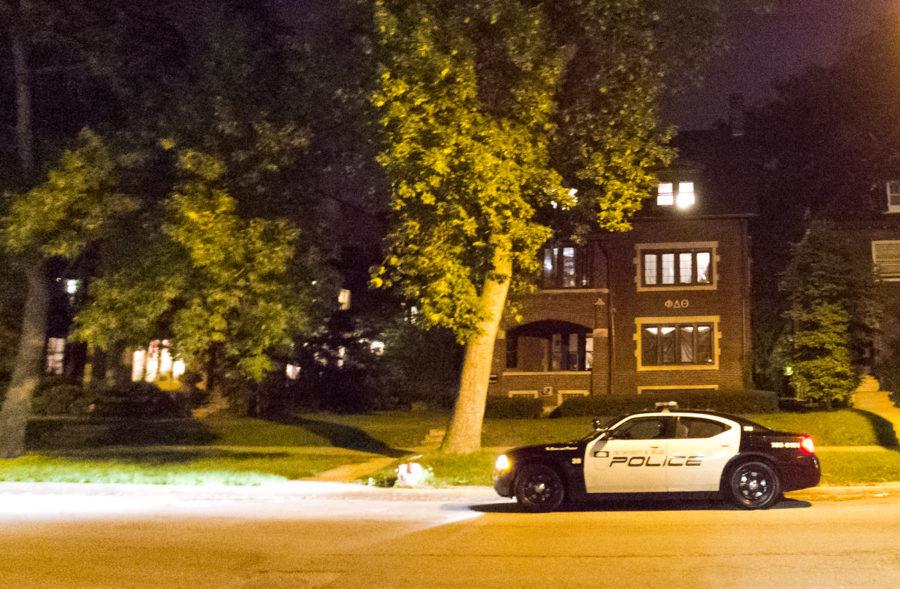








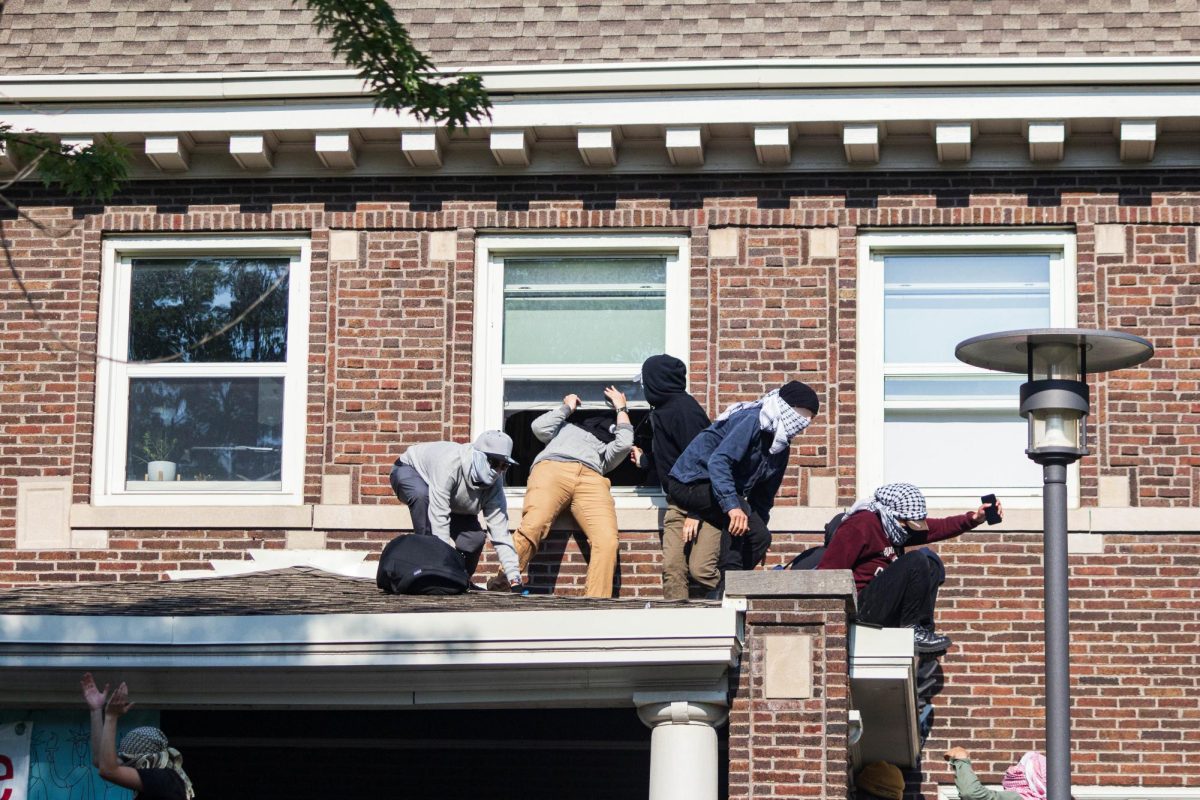
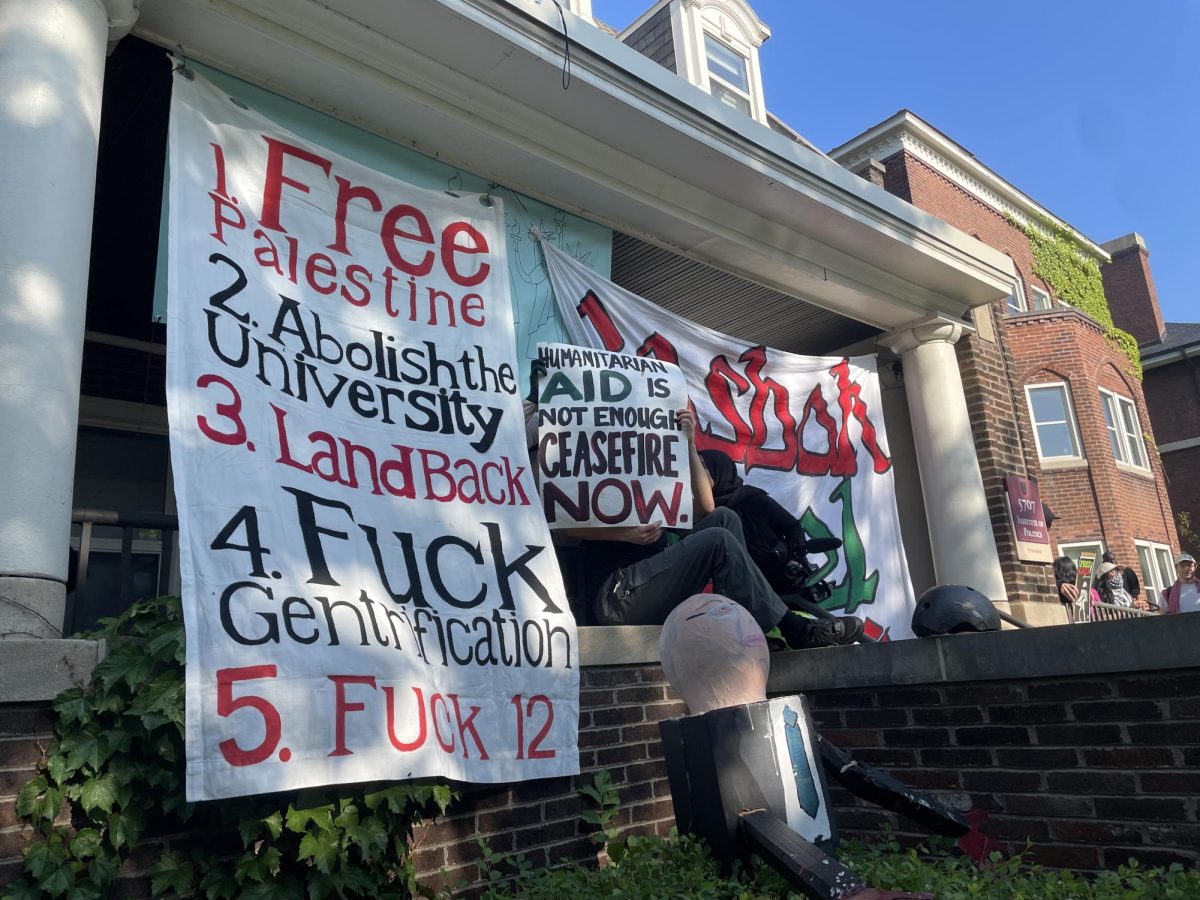
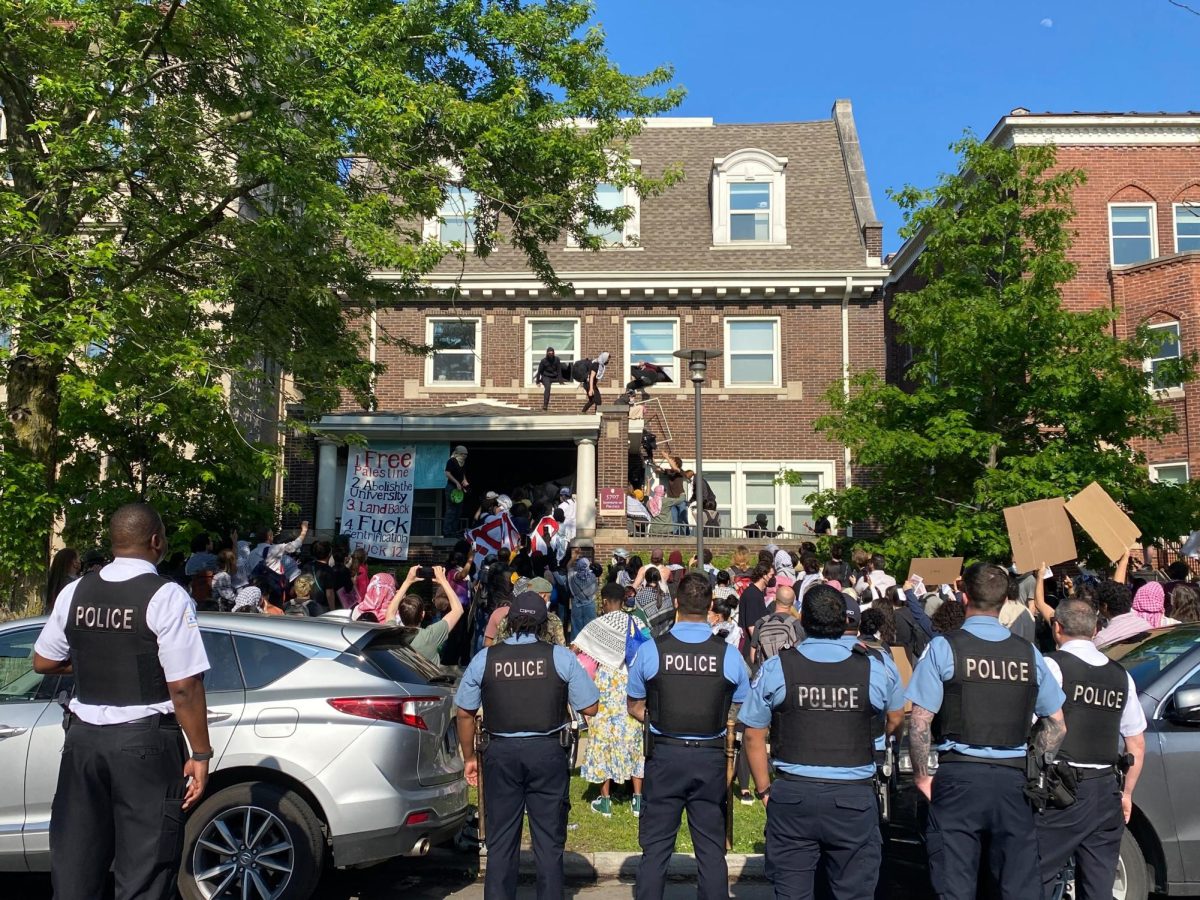
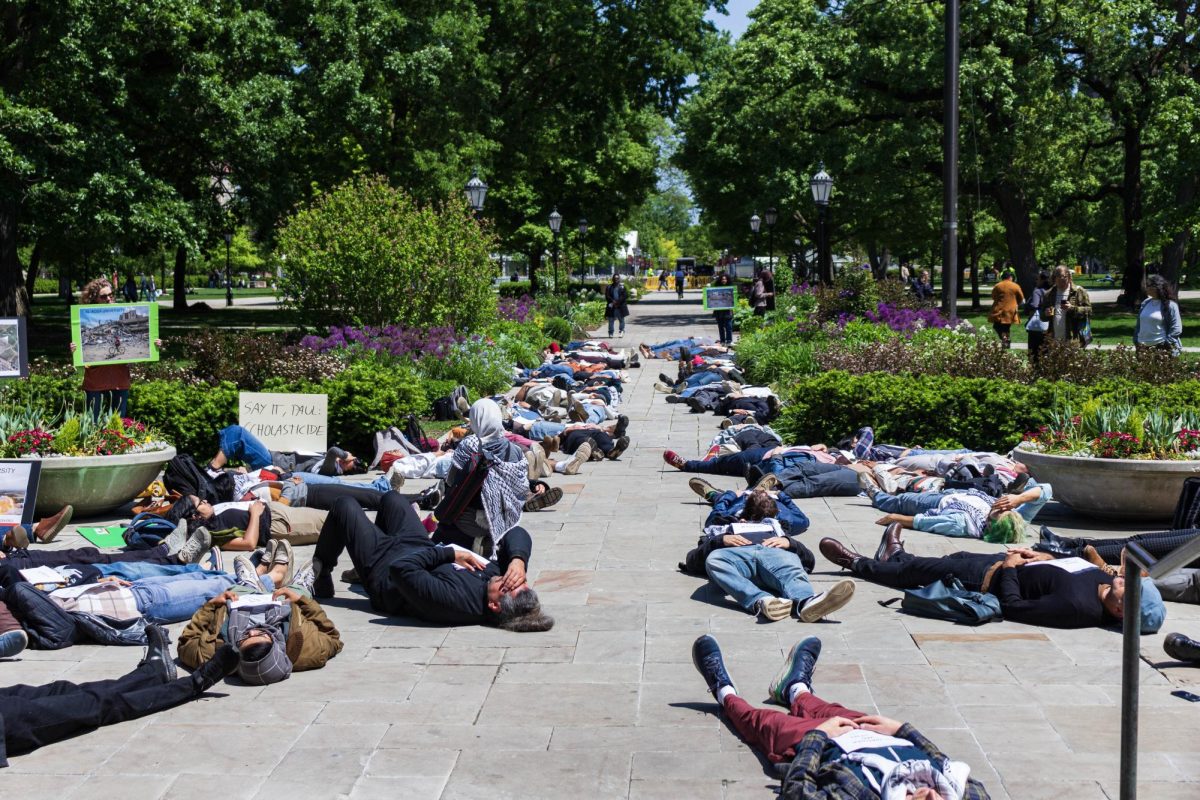
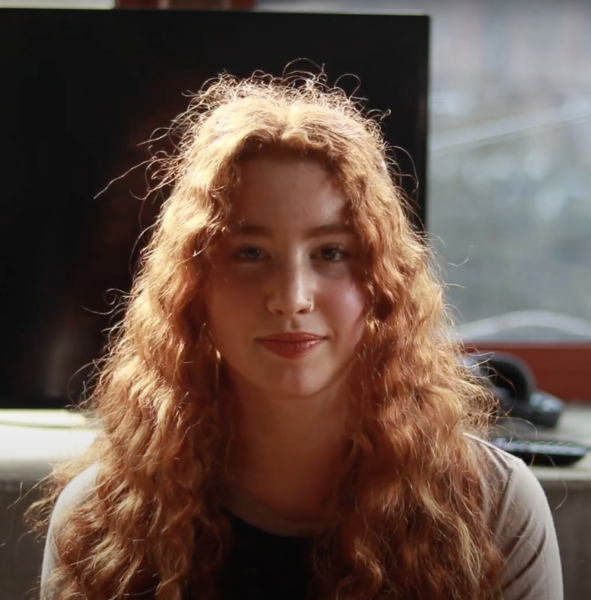
Yesi / Apr 30, 2024 at 11:19 am
It’s disturbing that despite the amount of money the university has, it does not have the ability to hire competent employees to do what they’re supposed to. Officers still respond quickly and keep the campus as safe as they can. As a past employee, I can say that all officers are hard working and despite not getting the money they’re supposed to get, they are still dedicated to the community and responding even when some of the community (and employers) do not appreciate or understand what the officers are exposed to and respond to every single day and ultimately the danger we are exposed to responding to calls. Wonder what the university will do when UCPD officers realize they can be paid more, in a better environment, and not have to deal with employees who still work from home and are never available to do their job, not answering phone calls or emails. The university has no problem paying them, but I guess screw the officers who respond to these life threatening calls protecting those who fund the university.
FYI UCPD- many departments have recently settled on a new contract paying a lot more , in better conditions . The grass is greener
PS. Shoutout to the union for their hard work and ucpd , keep doing what you do and don’t stoop down to their level
Samantha / May 1, 2024 at 9:50 pm
I personally think officers have enough stress and worry to last a lifetime. I don’t think they should be worrying about “ discrepancies” in their pay. They have families too that they need to protect and provided for and that should matter to the university.
Phoenix Falling / Apr 29, 2024 at 12:24 pm
Despite their claims the university does not value their officers. They only value officers when they are in need. It’s truly shameful they won’t pay one of their former officers money owed to them.
As a former officer that has had the opportunity to work at several law enforcement agencies, I can say the best career move I made was leaving. Any capable officer can easily go make more money and have better benefits like pensions and free healthcare. The stuff UCPD officers are fighting for like Line of Duty benefits isn’t even a conversation at other agencies it’s just a given.
Bill Goldberg / Apr 29, 2024 at 7:53 am
Everyday officers put on their uniform and come to work not knowing if they will make it through the work shift or not. They risk their lives to maintain peace and enforce the law. It’s insane knowing those former officers were not paid out for pay increases that rightfully earned years ago. It’s even more insane that this strategy is still being used on current officers.
Levi / Apr 28, 2024 at 9:34 pm
Wow that\’s really alarming that the University is hanging there officers out to dry when they need them the most right now. crime increasing, students protesting hospital being flooded with gun shot victims. It seems like the students are getting robbed everyday now. can you imagine if the police weren\’t there?
Gabe / Apr 28, 2024 at 6:39 pm
I agree entirely with the facts of this article and how the University frequently reflects how the department is a crucial part of its infrastructure and yeah like most infrastructure in America it is underfunded and lacks investment to keep the community safe.
Gordon Dameron / Apr 27, 2024 at 5:49 pm
This a well written article, I fully support every fact that has been mentioned by the author. I look forward to future interviews with media sources to expose the University’s unfair & deceptive labor practices of their dedicated law enforcement officer’s. Keep up the good work Victor as well as the other union staff.
Don / Apr 27, 2024 at 5:10 pm
What a terrible way to treat your police department. Crime is out of control in Hyde park. Cpd is no where to be found when you call 911 but UCPD will be there and are way more professional. Hyde park supports ucpd.